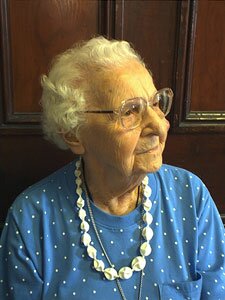FACETIME: 'Miss Peggy': Flannagan left her mark on Miller
In 1922, the year Peggy Flannagan first arrived on the Miller School campus to assume her duties as a teacher and administrative assistant, Warren G. Harding was in the White House, the literary world was abuzz over James Joyce's new novel Ulysses, and construction had just begun on Yankee Stadium. For the next 84 years, from Harding to Bush, Ulysses to The DaVinci Code, Babe Ruth to Derek Jeter, Flannagan was a constant and influential presence on the Miller campus and on the thousands of students (including this reporter) she saw in her time.
And though she passed away January 23 at the age of 102, it appears "Miss Peggy's" presence at Miller and around the world will live on in those who knew her.
Jessie Haden, a Miller government teacher who worked with Flannagan for 40 years, says that it was more than just Flannagan's longevity that made her the school's mainstay.
"She cared about every single person– child or adult– who walked through the doors," Haden says. "She would see weaknesses in people and discuss what they needed to do to change because she loved them. She wanted to make every single person a better person."
One such person was Stewart Ralston, a 2006 Miller graduate, now a freshman at N.C. State. Though the two were many decades apart in age, they became fast friends in the four summers Ralston stayed with Flannagan in her apartment in "Old Main."
"I'd get there about five, and we'd talk about anything," Ralston says, "mostly about what was going on at Miller or her memories of kids she'd known. It was amazing how specific she could be."
According to Haden, that facility in getting to know children went far beyond names and faces.
"If she heard rumors of a student who needed some counseling," Haden explains, "she'd ask if they were true and then say, 'I'll catch them.'"
It was a practice Ralston herself witnessed as Flannagan reached and then passed the century mark.
"There were always a couple of kids," Ralston says, "who every time they were in the dining hall, she'd take by the hand and ask how they were doing, if they were staying out of trouble, if they were doing well in their classes."
And Ralston says Flannagan watched happily as Miller grew from an all-male, all-white military academy to a college-preparatory school open to boys and girls of all races.
"She told me about the racial tension she saw growing up and how horrible she thought it was that people could be that way," she says. "She loved the diversity of Miller that wasn't there when she started."
So what was the secret to her longevity?
"She told me that being around young people was what kept her young," Haden says, "and she saw the good in all of them."

Peggy Flannagan
COURTESY OF MILLER SCHOOL
#